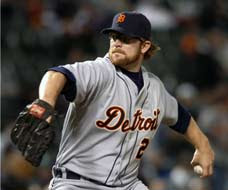In stating her case for Crawford she states the following:
.
Crawford has the speed, the quickness and the instincts. He's also is in a league that doesn't emphasize the stolen base as much as the NL, which certainly helps put his totals below that of players like Reyes and Pierre
That is something you will hear broadcaster and other journalist comment on time to time; the big difference between AL style ball verses NL style ball. I tend to think this is way overblown. Granted, the difference may have been more pronounced several decades ago, but now with free agency players very often switch leagues. Also managers switch a lot and they would bring their styles of play with them right?
I haven't done a ton of research on this and apparently Amy Nelson hasn't either. I don't quite know what she means by the "emphasize the stolen base" but I would nearly guarantee that she didn't know the the average AL team in 2007 had 97 stolen bases with a 73% success rate. The average NL team stole 98 bases with a 74% success rate (an average AL team has had more stolen bases in a season than the average NL team in four of the last eight seasons). Just maybe Amy thought that 1 base and 1 % difference last season was enough of a factor to limit Crawford stolen base output. Or maybe this is how baseball myths get passed around ?
PS:I know the whole DH and pitcher thing is a obvious and very real difference. But what about the general hyperbole you will hear that the AL is the power hitting league and the NL is the base stealing league. This is something I have heard old retired ball players ramble on about during broadcast. While only twice in the last eight seasons has the average NL team out homered the average AL team (including 169 to 161 last season) the differences are often explained simply by the DH. You will hear some exaggerate as if the NL style is more pure and wholesome baseball while the AL is the lazy, wait for the three run homer league. Not exactly true. Little things like this annoy me way more than the average person probably ......


Wouldnt you agree that the best teams make it to the playoffs? Wouldn't you also agree that most teams that make the playoffs have above average pitching? Wouldnt you also agree that there is more pressure to perform in the playoffs (i.e. you lose and you are done; you are in more of a national spotlight)? Doesn't it make sense then that postseason numbers may drop some from the regular season? Lets see a comparison between the average player's regular season vs postseason to see if Jeter truly is "clutch"!
C-dubb, Good to see you are reading my blog !!! haha I do agree with your points ( if you read my comment a couple above yours) that in the postseason the pitching is generally better so it is impressive that Jeter's batting line is basically the same as his regular season. I am not saying clutch performances don't exist. I will def give you that a player doing something great like pitching a shutout in a post season could be considered clutch, if you want to think of it in that terms. Where this discussion irks me is where you will often hear fans or the media give Jeter or others that mythical Clutch God label that he raises his game to another level when the chips are on the line. its just not true. There have been many studies, that you could easily look, up that show that consistently performing better in "clutch" situations is not a skill that a player is capable of repeating like other skills such as hitting for power, plate discipline, even running speed. Those things are skills. Performing well in clutch situations is not. Its mostly a product of what we seem to remember the easiest(big time performances stick out in our minds more,we place more significance to them) For ever post season serious where Jeter was a clutch beast, there are also series where he stunk up the joint. Same for all players. its a product of statistical fluctuation, not players having a magical ability to play better than there natural level of ability because the calender says October rather then May.